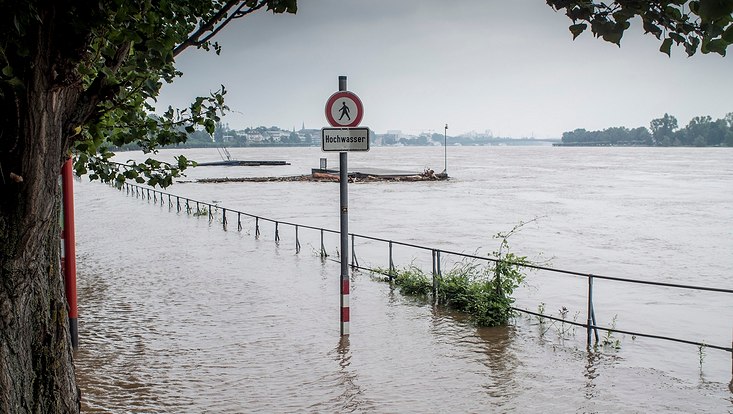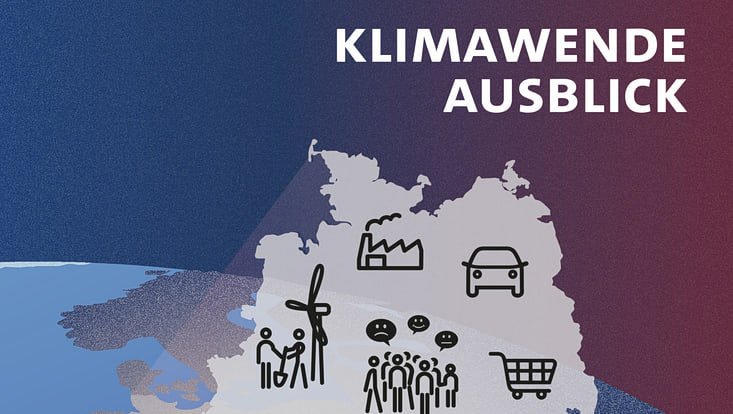and Society (CLICCS)
Representative study on perceptions of climate changeMore Germans now consider climate change to be a threat
12 October 2023, by Niklas Keller

Photo: Pixabay/SamuelFrancisJohnson
Extreme weather events such as droughts and forest fires are increasing. And storms could also become stronger. How do Germany’s citizens feel about this? Do they view climate change as a threat? And do they expect to be personally impacted? Prof. Beate Ratter and Annika Runge from the Cluster of Excellence CLICCS conducted a representative study. As the results show, 77 percent of those surveyed consider climate change to be a “substantial” or “very substantial” threat. That’s 14 percent more than in 2014, the last time the survey was conducted.
If we focus on the group that considers climate change to be a “very substantial” threat, the growth is even more evident – from 17 percent in 2014 to 35 percent in 2022. The authors found the smallest change among those respondents who didn’t view climate change as a threat at all; here, the number went from six to five percent in 2022.
As we can see, many citizens no longer expect the impacts of climate change to arise sometime in the distant future. 94 percent of those surveyed claimed they could either already see the effects of climate change or expected to see them within the next ten years. Of that group, 80 percent claimed they already saw the effects; in 2014 the number was only 56 percent. “In this regard, the extensive and frequent media coverage, including that of comparatively distant climate disasters like the wildfires in California and flooding in Australia, has most likely been a factor,” says Annika Runge.
Preparedness thanks to warning and weather apps
But do such concerns translate into taking precautions? 63 percent of those surveyed reported having already installed warning and weather apps, or that they planned to do so. The majority also considered insurance to cover potential damages an option. 58 percent had already taken out insurance or planned to do so. In addition, more than half of all respondents claimed to have set aside food reserves in case of an emergency (55 percent) or planned to organize a community support program (54 percent); some had already done so. The preferences seem to vary with age: Installing warning and weather apps, at 75 percent, was the top choice for the youngest age group (14- to 29-year-olds), whereas organizing a community support program, at 61 percent, was the preferred option for those over the age of 60.
In the course of the study, the citizens surveyed were also asked which type of natural disaster they felt would have the worst impact on their region. Droughts were frequently cited, followed by heat waves and heavy rain. Regional differences had a significant influence on respondents’ answers. Whereas wildfires were considered to have the greatest potential impacts in Saxony and Brandenburg, in North Rhine-Westphalia respondents tended to choose flooding and coastal storm surges. “In 2014, the respondents above all chose storms, flooding and heavy rain. This shows the importance of direct personal experiences with extreme weather events and how respondents’ answers can change over time,” Prof. Beate Ratter explains.
More people expect to be personally impacted by climate change
As extreme weather events become more frequent, the risk of being personally affected is rising. In 2014, 69 percent of those surveyed felt this was possible; in 2022, the number rose considerably to 81 percent; only eight percent didn’t expect to be personally affected at all (28 percent in 2014).
The study confirms that citizens’ attitudes on climate change and its impacts are to a considerable extent regionally influenced. Also, recent personal experiences are essential to shaping citizens’ risk assessments. “In terms of risk communication and implementing adaptation measures, we need to bear in mind that measures are more likely to be supported when citizens understand the need for them. And personal precautions are only taken when they consider the threat to be something that could affect them personally,” says Ratter.
The representative survey was conducted in September and October 2022 with the support of the Cluster of Excellence “Climate, Climatic Change, and Society” (CLICCS) – for the third time, following 2011 and 2014. Based on a telephone survey conducted by the opinion research institute Forsa, it involved 3,000 participants. The study shows how our society views the challenges associated with climate change in Germany. In turn, this can be used to determine which future developments are plausible – one of the central goals of the Cluster of Excellence CLICCS.
Study results available for download
Ratter B, Runge A (2022): Klimawandelwahrnehmung und Extremereignisse in Deutschland, 2022. (PDF)


